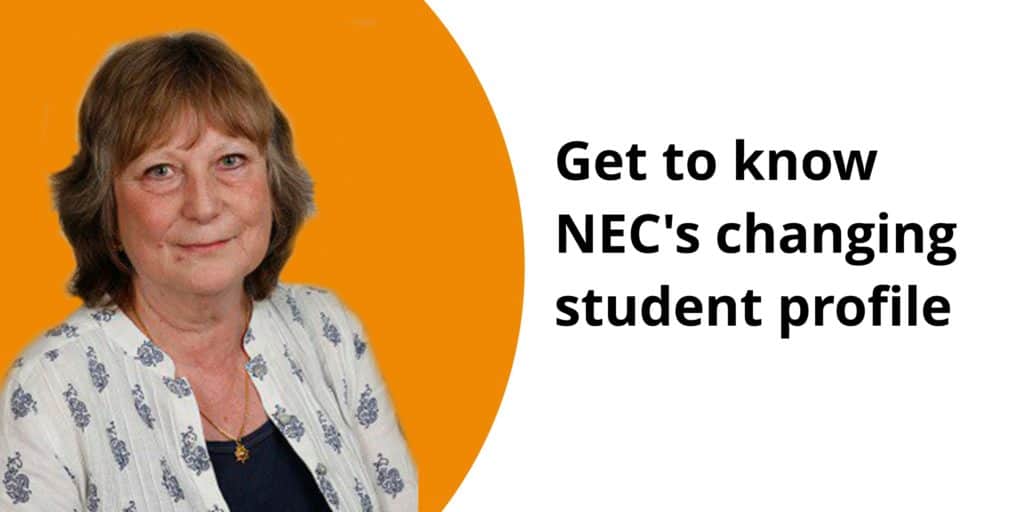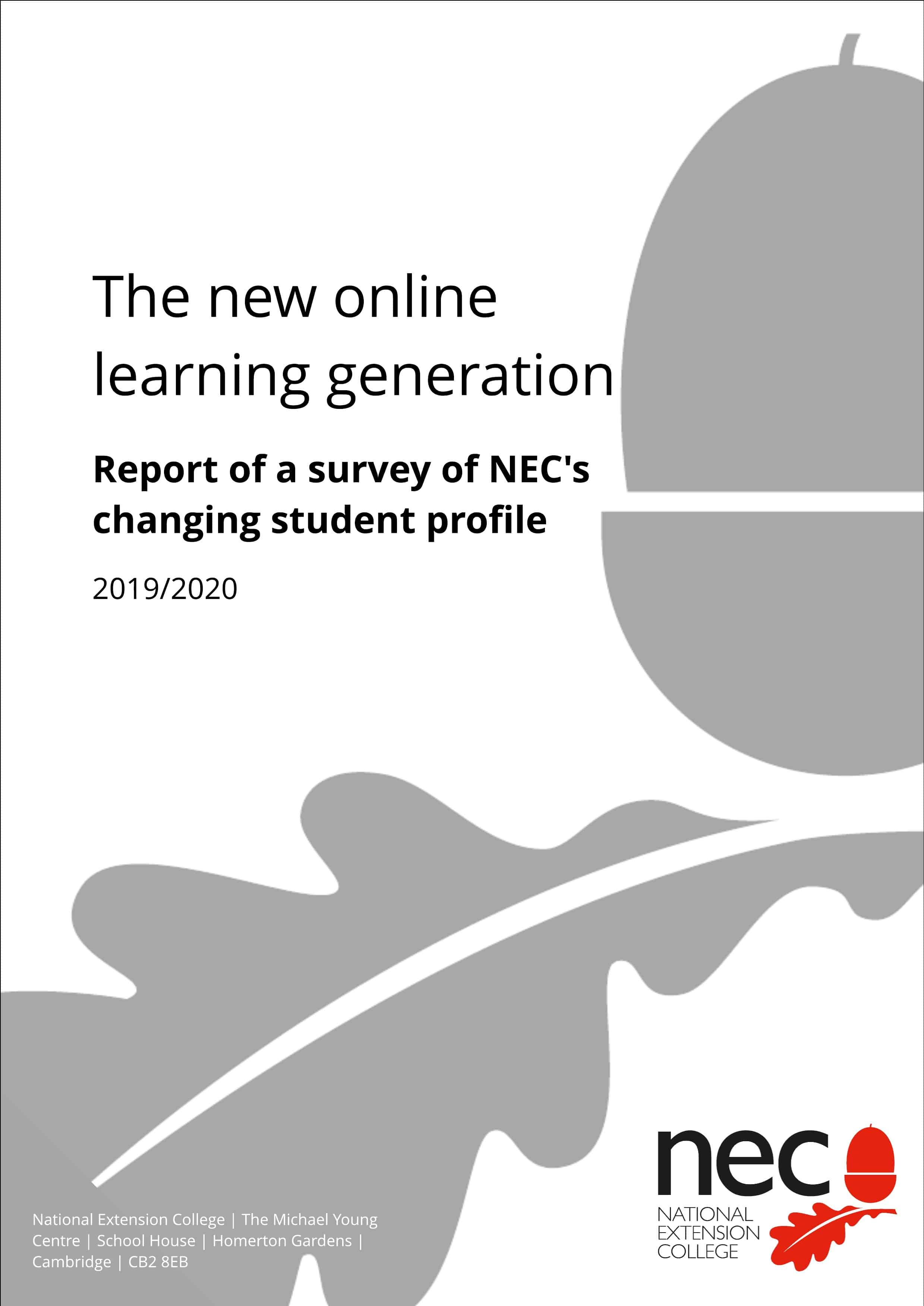Call free on: 0800 389 2839
Call free on: 0800 389 2839
Join in... The latest news and blogs from NEC
The new online learning generation Wednesday, 13 January 2021

Report of a survey of NEC’s changing student profile
If you left school as I did without the currency of 5 good GCSEs and 2 or 3 good A levels, you will find that as an adult many doors will never open for you, no matter how much you achieve in your life or career. Of course there will always be people who succeed and fly high despite their lack of qualifications, but they are mostly in sectors like business and the arts where success can come through talent and hard work.
If you aspire to a career in the civil service or sectors like health, social work, teaching or policing, then you won’t get very far without the standard academic entry requirements. Government and policy makers who are tasked with increasing the numbers of nurses, teachers or police officers often forget that as well as providing funding for the training places, they also need to support the pathways to the training and help aspiring career changers fill the gaps in their educational qualifications.
This is where NEC comes in. We were set up as an educational charity in 1963 by Michael Young who said ‘The main hope for the future is education’ and recognised in the 60’s that technological change would require most people to alter their jobs and have to retrain during their lifetime. ‘This they will only be able to do if the educational system keeps pace, and it will only do so if, besides other reforms, the needs of the home student are fully met’. Although this was written in 1963, it still resonates today and the focus of the ‘home’ student has an even deeper meaning during this pandemic where home has become the place where children are taught, online shopping is delivered, you meet your family and friends through video and it is also the place that you work and study.
A report of a survey is a snapshot of a moment in time and researchers who devise surveys know that the results depend on who chooses to respond from the sample and also on the questions selected and how they are worded. Of course large samples and good response rates give a level of confidence in the validity of the results and in analysing this survey, we were careful to check how our respondents matched the student body as a whole (we found that both women and older students were more likely to respond).

However, this survey is not an isolated one, it is a survey of a distinct community of learners who have been at the heart of NEC’s work since it was set up in 1963. These are the people who fall between the gaps of the state school and further education provision. They are people who left school without the necessary qualifications they need to progress and to change their pathway. They are also people who because of work, family or other circumstances are not able to attend regular classes at a school or college.
NEC knows these students well and we are full of admiration for their motivation, resilience and achievements. As you will see from the survey results, the majority of these students are planning to continue their education by going on to university, further education, professional courses or apprenticeships. They are not well off financially but they are paying for their own fees. They have all chosen to study online through distance learning which makes them a distinct group, but also they are trailblazers for the way learning will be delivered in the future.
There is an unfortunate view that distance learning is marginal and even possibly second best to face-to-face provision. This is reflected in the lack of funding, advice and guidance available for students who chose to learn online and also the lack of provision for these students to get assessed for GCSE, A level and vocational qualifications. NEC has always campaigned to remove the barriers and provide better resources for students, especially those who have to enter the public exam system as private candidates. We know the practical difficulties and the high costs are a significant factor in the decline in the numbers of mature and part time students.
By good fortune the second part of our survey took place in the summer of 2020 after the call to ‘stay at home and save lives’. As soon as the impact of COVID-19 resulted in the closure of schools, colleges, adult education centres, and community education, there was an increase in demand for online courses. This was amplified by the take up of Zoom classes, online shopping and banking and even medical consultations. ‘Home’ has a different meaning for everyone now; as well as the place you live and sleep, it is also the place you work, teach your children, engage in your own learning, shop and socialise remotely. Although we hope that the pandemic will leave us and that life will get back to normal, we believe that increasingly students of all ages will embrace learning from home, which is why NEC students are trailblazers.
This blog post was adapted from the Foreword of A new online learning generation and was written by NEC’s CEO, Dr Ros Morpeth OBE.
Leave a Reply Cancel reply
More stories
working at NEC
Uncategorized
- Balancing an A level with My Passion for Dance
- The Future of Art History: Why Study A level History of Art with the National Extension College?
- Why Study Physics?
- Embracing a New Path: Jill’s Journey from Online Learning to Career Success in Art History
- How Toby Found a Perfect Fit for His Passion: Online A level English Literature with NEC
Study Tips
Student Stories
- Balancing an A level with My Passion for Dance
- Passion and Academics: How Izzy Balances Full-time Musical Theatre Studies with Studying A level Physics
- How NEC Helped Kari’s Son Niko to Continue his A level Studies Despite Long-Term Illness
- Embracing a New Path: Jill’s Journey from Online Learning to Career Success in Art History
- How Toby Found a Perfect Fit for His Passion: Online A level English Literature with NEC
SFT
Results Day
- Resitting A level STEM Subjects: How to Turn Your Setback into a Stepping Stone for a Brighter Future
- Resits vs. Retakes: Understanding the Difference and Making the Most of Your Second Chance
- GCSE Results Day 2024: What to Do When You Didn’t Get the GCSE Results You Wanted
- GCSE Results Day 2024: Your Complete Guide
- A level Results Day 2024: Your Ultimate Guide to Success
Policy and Campaigns
- A Pathway to Success Beyond A levels: Why Level 4 and Level 5 Qualifications Matter
- Schools and Academies Show 2024: Insights for School Leaders
- Big Data and Educational Trends: Insights for Students and Schools
- University of Cambridge Institute of Continuing Education offers tuition fee bursary for NEC A level students
- Five study bursaries for state sector teachers to take online A level Classical Civilisation offered by The Classical Association
Podcast
Our Courses
- Balancing an A level with My Passion for Dance
- How NEC’s Inclusive Approach to Learning Design is Redefining Independent Learning
- NEC’s Learning Design: A Pathway to Success for Independent Learners
- Passion and Academics: How Izzy Balances Full-time Musical Theatre Studies with Studying A level Physics
- Why Study Psychology? – Key Benefits, Careers and What You’ll Need to Study Psychology at University
Lifelong Learning
- A Pathway to Success Beyond A levels: Why Level 4 and Level 5 Qualifications Matter
- Benefits of Homeschooling: Is Home Education Right for Your Family?
- How NEC’s Inclusive Approach to Learning Design is Redefining Independent Learning
- The Future of Art History: Why Study A level History of Art with the National Extension College?
- National Coding Week 2024: The Vital Role of Coding in the Modern World
Home Schooling
- Benefits of Homeschooling: Is Home Education Right for Your Family?
- How NEC Helped Kari’s Son Niko to Continue his A level Studies Despite Long-Term Illness
- Exploring Science Practicals at Home: A Guide for Homeschoolers
- Homeschooling in 2024: How to Personalise Your Child’s Education
- What is Homeschooling?
Guest Blogs
- Passion and Academics: How Izzy Balances Full-time Musical Theatre Studies with Studying A level Physics
- My Experience as a Marketing Intern with the National Extension College
- The economics of political parties
- Embarking on a journey: My decision to ‘Fast-Track’ A level Physics with NEC
- Homeschooler Andrew’s experience of studying IGCSE Chemistry
General
- Balancing an A level with My Passion for Dance
- A Pathway to Success Beyond A levels: Why Level 4 and Level 5 Qualifications Matter
- Schools and Academies Show 2024: Insights for School Leaders
- How NEC’s Inclusive Approach to Learning Design is Redefining Independent Learning
- NEC’s Learning Design: A Pathway to Success for Independent Learners

Add a new comment
Current comments: 0